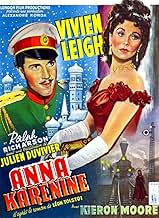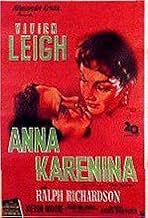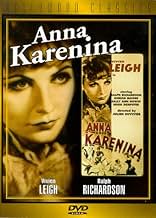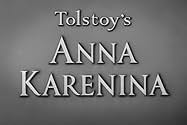AVALIAÇÃO DA IMDb
6,6/10
3 mil
SUA AVALIAÇÃO
Adicionar um enredo no seu idiomaA married woman's affair with a dashing young officer has tragic results.A married woman's affair with a dashing young officer has tragic results.A married woman's affair with a dashing young officer has tragic results.
Niall MacGinnis
- Levin
- (as Niall Macginnis)
Enredo
Você sabia?
- CuriosidadesVivien Leigh's costumes were made in Paris by Barbara Karinska to Cecil Beaton's designs. She was in such pain wearing them that she even went to her doctor fearing she had broken her ribs. It was subsequently discovered that the dresser had been putting the corsets on upside down.
- Citações
Anna Karenina: My dear Korsunsky, you know very well I never dance unless I can help it.
- Cenas durante ou pós-créditosClosing credits: "And the light by which she had been reading the book of life, blazed up suddenly, illuminating those pages that had been dark, then flickered, grew dim, and went out forever".
- Versões alternativasU.S. release version runs approximately 112 minutes. This is the version issued by Fox DVD in 2007.
- ConexõesFeatured in Vivien Leigh: Scarlett and Beyond (1990)
Avaliação em destaque
First off, let us concede that neither the 1935 Greta Garbo "Anna Karenina" nor the 1948 Vivian Leigh version comes close to capturing the complexities of Tolstoy's masterpiece. Most significantly, Konstantin Levin and Kitty's relationship, and more particularly, Levin's protracted personal and metaphysical development, are dropped entirely, both screenplays preferring to treat the story as an adulterous romantic triangle with snowflakes instead of palm trees.
That said, what we are left with in both films are masterpieces of film craftsmanship, where the triple triumphs of cinematography, art direction, and costume design are the real stars.
Which is not in any way to lessen the contributions of the cast, who in both instances, make the best of what they have to work with.
Garbo enchants in many of her individual scenes, particularly with Freddy Bartholomew and Maureen O'Sullivan, (as Kitty). Who can forget her advising Kitty to seize her fleeting youth, with its promise of a dream prince to emerge from the blue haze of the mountain top. Equally impressive, is her muted aversion to Alexei Karenin, (Basil Rathbone).
But she fails in her depiction of a fatal love for Count Vronsky (Frederic March). Garbo, with her solemn, majestic and singular self possession--her "Queen Christina" like cerebral detachment, is simply too thoughtful, too deliberate, to in any way convey Tolstoy's impulsive, febrile and thoughtless anti-heroine.
True, she had forsaken all for John Gilbert in "Christina," but that decision was the result of deep and thorough soul searching, and explained with the eloquence of Solomon to her courtiers. In "Camille" she is by profession a lover, and so her ultimate renunciation of Armand, reveals the true depth of her character. But one cannot conceive of her destroying the lives of others to satisfy a whimsical infatuation.
And this is where Miss Leigh's Anna trumps Garbo, for Miss Leigh does successfully transmit Anna's neurasthenic and utterly reckless collapse at the feet of the dashing Count. She seems blown by forces much stronger than she--a daffodil in a windstorm, and light years from Garbo's deep Scandanavian imperturbability.
Given the alleged similarities between Miss Leigh and Anna's disposition, perhaps this is life imitating art. In any case, it is why she makes a truer Anna, and why the role serves as a warm up for Blanche Dubois...
She is also abetted in her interpretation, by the genuinely eerie, recurring, nightmare sequence--with the Charon like, white bearded old man, forever dogging her as he chinks away at the ice. An ill omen indeed ! And Miss Leigh conveys the desperation of her impending doom in every gesture and nuance.
Then too Keiron Moore, (despite being an inferior actor to Frederic March) is much more dashing and handsome as Vronsky--a fact which, at least in terms of audience sympathy, helps explain the attraction.
Strangely, Mr. March who had been so visually appealing as Dr. Jeckyll, just a few years earlier, photographs very poorly in the Garbo version, and is not helped by a buzz haircut.
And as superb as Cedric Gibbons sets and Adrian's costumes are as a backdrop for Garbo, we feel Mr.Andrejew's art direction and Cecil Beaton's designs get the nod here as well, if only perhaps in their European origin, and the deep, appropriately moody nineteenth century shadows with which they are lit and photographed.
However, as visually sumptuous cinematic recreations of a vanished aristocratic world--each version has much to savor, and should be taken in tandem.
That said, what we are left with in both films are masterpieces of film craftsmanship, where the triple triumphs of cinematography, art direction, and costume design are the real stars.
Which is not in any way to lessen the contributions of the cast, who in both instances, make the best of what they have to work with.
Garbo enchants in many of her individual scenes, particularly with Freddy Bartholomew and Maureen O'Sullivan, (as Kitty). Who can forget her advising Kitty to seize her fleeting youth, with its promise of a dream prince to emerge from the blue haze of the mountain top. Equally impressive, is her muted aversion to Alexei Karenin, (Basil Rathbone).
But she fails in her depiction of a fatal love for Count Vronsky (Frederic March). Garbo, with her solemn, majestic and singular self possession--her "Queen Christina" like cerebral detachment, is simply too thoughtful, too deliberate, to in any way convey Tolstoy's impulsive, febrile and thoughtless anti-heroine.
True, she had forsaken all for John Gilbert in "Christina," but that decision was the result of deep and thorough soul searching, and explained with the eloquence of Solomon to her courtiers. In "Camille" she is by profession a lover, and so her ultimate renunciation of Armand, reveals the true depth of her character. But one cannot conceive of her destroying the lives of others to satisfy a whimsical infatuation.
And this is where Miss Leigh's Anna trumps Garbo, for Miss Leigh does successfully transmit Anna's neurasthenic and utterly reckless collapse at the feet of the dashing Count. She seems blown by forces much stronger than she--a daffodil in a windstorm, and light years from Garbo's deep Scandanavian imperturbability.
Given the alleged similarities between Miss Leigh and Anna's disposition, perhaps this is life imitating art. In any case, it is why she makes a truer Anna, and why the role serves as a warm up for Blanche Dubois...
She is also abetted in her interpretation, by the genuinely eerie, recurring, nightmare sequence--with the Charon like, white bearded old man, forever dogging her as he chinks away at the ice. An ill omen indeed ! And Miss Leigh conveys the desperation of her impending doom in every gesture and nuance.
Then too Keiron Moore, (despite being an inferior actor to Frederic March) is much more dashing and handsome as Vronsky--a fact which, at least in terms of audience sympathy, helps explain the attraction.
Strangely, Mr. March who had been so visually appealing as Dr. Jeckyll, just a few years earlier, photographs very poorly in the Garbo version, and is not helped by a buzz haircut.
And as superb as Cedric Gibbons sets and Adrian's costumes are as a backdrop for Garbo, we feel Mr.Andrejew's art direction and Cecil Beaton's designs get the nod here as well, if only perhaps in their European origin, and the deep, appropriately moody nineteenth century shadows with which they are lit and photographed.
However, as visually sumptuous cinematic recreations of a vanished aristocratic world--each version has much to savor, and should be taken in tandem.
- BrentCarleton
- 15 de fev. de 2007
- Link permanente
Principais escolhas
Faça login para avaliar e ver a lista de recomendações personalizadas
Detalhes
- Data de lançamento
- País de origem
- Central de atendimento oficial
- Idiomas
- Também conhecido como
- Alexander Korda's Production of Tolstoy's Anna Karenina
- Locações de filme
- Monterey, Califórnia, EUA(racetrack and steeplechase scenes)
- Empresa de produção
- Consulte mais créditos da empresa na IMDbPro
Bilheteria
- Orçamento
- US$ 2.000.000 (estimativa)
- Tempo de duração2 horas 19 minutos
- Cor
- Proporção
- 1.37 : 1
Contribua para esta página
Sugerir uma alteração ou adicionar conteúdo ausente

Principal brecha
By what name was Anna Karenina (1948) officially released in India in English?
Responda


































